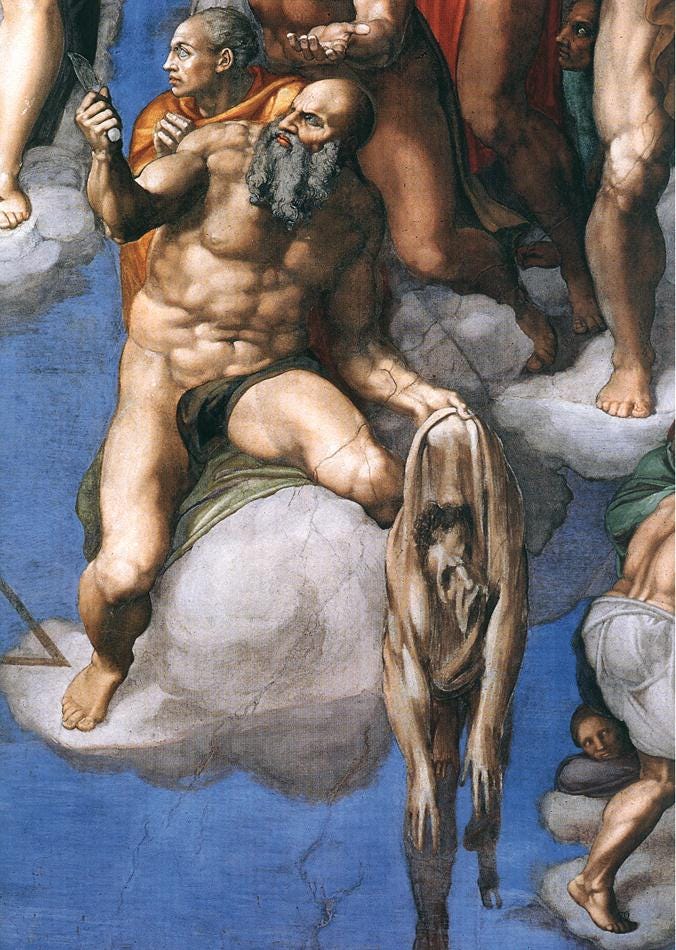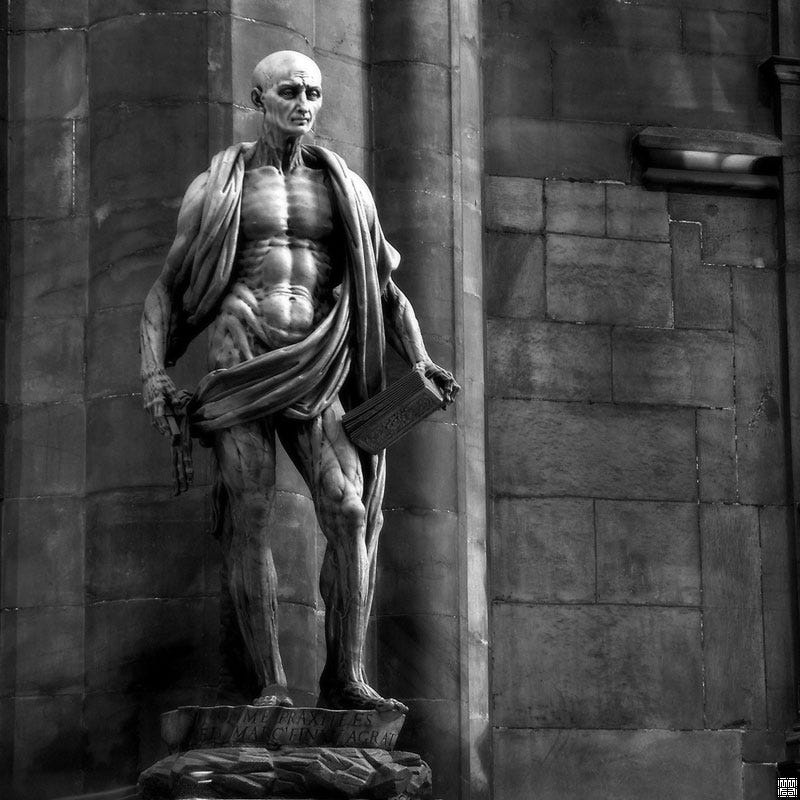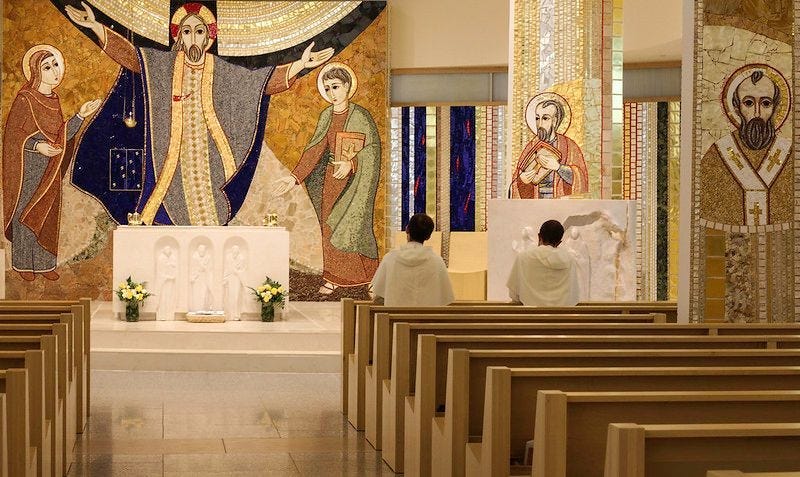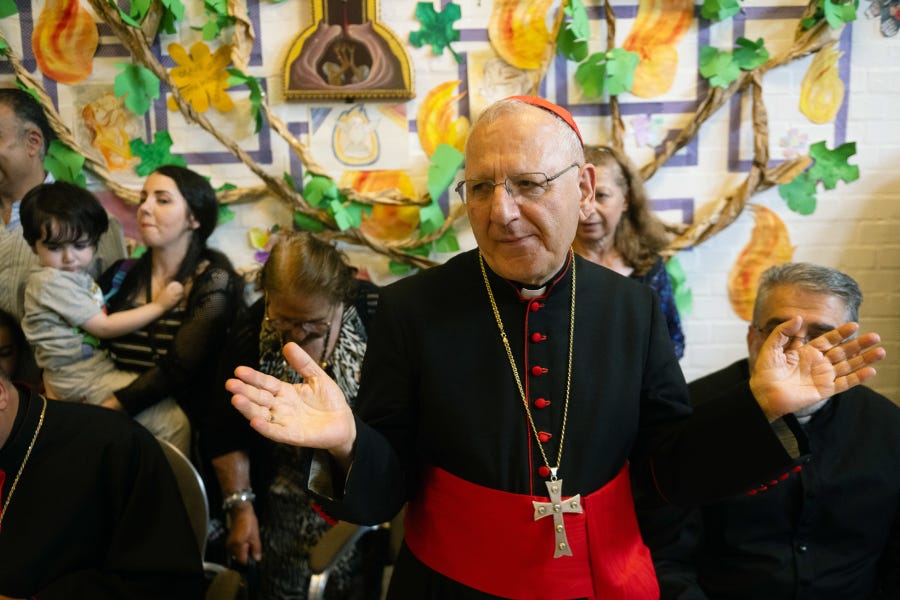Hey everybody,
Welcome to the Tuesday Pillar Post.
Today is the Feast of the Apostle Bartholomew.
I find him fascinating. Why? Because of how little we can be sure we know about him.
Here’s what I mean:
We know Bartholomew was an apostle, because Matthew, Mark, and Luke tell us, and the Church’s tradition confirms this and expresses it liturgically. He is traditionally regarded to be the same person as Nathaniel, who is mentioned in the Gospel of John, but he might not be. We think Bartholomew is Nathaniel because they both seem in Scripture to have a close relationship with the apostle Philip.
We can’t be really sure what his name is. Bartholomew is probably a patronymic: It means “Son of Talmay.” So was it his name? Or was it used as a kind of surname referent (like “Simon Bar-Jonah” in Matthew 16)? Did he have a first name (was it Nathaniel?), or was Bartholomew actually a first name, like some scholars suggest? We really don’t know.
We know Bartholomew preached the Gospel after Pentecost. But where? We don’t know. There are traditions that send him to Armenia, Ethiopia, India, Azerbaijan, and a few other places too. Since place names aren’t concrete in hagiography, and “India” was a term used sometimes as a broad catch-all, we really can’t be sure where he actually went.
All Bartholomew tales end with his martyrdom; we can be reasonably certain he was a martyr. He is usually believed to have been flayed alive, which is how he is depicted in the Sistine Chapel. But still, of course, there are differing accounts of his martyrdom.
Pope Benedict XVI put it bluntly: “We have no special information about Bartholomew.”
So here’s what I think is cool:
We have this guy who is an apostle of Jesus Christ, one of the twelve, a man upon whom our Church is founded. And we really know very little about him. Ultimately, we know that Jesus Christ chose him. And that’s enough for us.
Bartholomew has almost no brand identity or trademark recognition. We know him because he knew the Lord. And in a culture obsessed with self-marketing and personal branding, I think that’s great.
It is enough to know that the Lord called Bartholomew to follow him, gave him the gift of faith, and the gifts of the priesthood, made him an apostle, a primogeniture to two millennia of episcopal apostolic succession.
That we don’t know much about his life, and that various pious legends have built up in place of fact, reminds us that office is bigger than person, that Christ calls us each into the dignity of sharing in something much more lasting than our biographies: He calls us into the mystery of his own Incarnation, and the saving work of his cross and resurrection.
Being a part of the mystical body of Christ is so much more important than whether anyone is certain 2,000 years from now what our first name was, or where we were martyred. Christ called us. That is, and will always be, the most important moment of our biographies.
“St Bartholomew stands before us to tell us that attachment to Jesus can also be lived and witnessed to without performing sensational deeds. Jesus himself, to whom each one of us is called to dedicate his or her own life and death, is and remains extraordinary,” Pope Benedict XVI said in 2006.
He is the patron of Armenia, and bookbinders, and butchers, and dermatologists, among many other things. But I think St. Bartholomew has a case to become the patron of those laboring in the vineyard without the notoriety of Peter, or John, or Paul. Those of whom only the most important thing can be said with certitude: Christ called, and they followed.
St. Bartholomew, patron of the faithful ones outside of the spotlight, pray for us.
In the news
Straight cash, bishops
The U.S. Conference of Catholic Bishops is the most visible institution of Catholic hierarchy in the United States, but also one of the least understood. It is also, because of its prominence, one of the most criticized institutions in the Church, and often the criticism centers around money.
Whether you’re listening to Catholics left or right talk about the Church in the U.S., eventually someone will start talking about the USCCB, how much money it has, and what it does, or doesn’t do, with that money.
But there are a lot of misunderstandings about the USCCB and its money. This week, The Pillar’s contributing editor Brendan Hodge dove into some USCCB financial reporting, to breakdown how much money the USCCB has, how much it takes in, what it does with that money, and how that compares to other organizations.
It’s really an interesting read.
So where does the USCCB’s money come from? And how is it being spent?
To understand that, it may help to think of the bishops’ conference as three connected organizations, rather than one, because its revenues come from three very different sources, each committed and designated for different purposes.
Check it out. I’ve been following the conference for a pretty long time, and Brendan explained some things about the conference’s revenue that surprised me. You might be a bit surprised too.
—
McCarrick’s trial time
It’s interesting that McCarrick can be charged with this crime — the reason the statute of limitations hasn’t run out is reportedly because McCarrick, not a Massachusetts resident, left the state, effectively pausing the time clock on prosecuting the alleged crime.
Well, the former cardinal is due in Massachusetts next week for his first court appearance, a hearing called an arraignment. It was initially scheduled for this week, but was pushed back shortly after McCarrick was initially summoned.
So, what is an arraignment? What will happen? Will McCarrick speak? Will anyone testify?
We’ve got answers to all that and more. Here’s everything you can reasonably expect about McCarrick’s first day inside a criminal courtroom. If you want to amaze your friends with knowledge far beyond that of the average “Law & Order” watcher, read up here on what’s going to happen.
—
Brülhart off Hypothekarbank
Brülhart used to be the head of the Vatican’s financial intelligence agency, and before that he was the head of Liechtenstein’s financial intelligence agency. (The guy apparently has a like for small countries.)
In July, The Pillar reported that Brülhart had a consulting gig with the Vatican Secretariat of State while he was overseeing Vatican financial intelligence — this is, in the world of international finance and law enforcement — generally regarded as a big no-no. One cannot serve as a paid consultant to an organization which does business transactions one is charged with overseeing. While Brülhart’s attorneys say the arrangement was above board, it’s believed to be a big part of the reason that the financial guru is now facing a criminal trial.
Why is this a big deal? Because Brülhart is, or was, a pretty big deal in the world of international financial security. At one time, his affiliation with the Vatican lent its financial operations credibility. But it’s now becoming clear that even if Brülhart avoids conviction, his association with the Vatican financial scandal is being noticed in European banking circles, and is seen as a black eye for him.
If that’s the case, the Vatican City’s financial investigation, and the resulting trial, may end up catalyzing reform by deterrence. If global financial figures realize they’ll get caught, and be noticed, if they act badly in work at the Vatican City State, the Vatican’s banks might begin to shed their reputation for permitting money laundering and other not-so-good stuff.
And for banks which exist to serve the mission of the Gospel, that is a very good thing.
Final thoughts
Thank you to those of you who have subscribed to The Pillar this week. Last Tuesday we announced that we’d send $10 for each new paying subscriber to Mission to the Beloved, a Haitian Catholic apostolate that both preaches the Gospel and is helping Haitians recover after an earthquake, followed by a tropical storm.
We invited you to become a paying subscriber, and see us send your money to Haiti. A lot of you responded to that invitation. And in fact, we decided to keep it going through this week. So if you become a paying subscriber to The Pillar by Friday, we’ll send an additional $10 to help Haitian Catholics through Mission to the Beloved.
Plus, you’ll help The Pillar continue to report news that matters about the Catholic Church, from a perspective of faith, with no partisan loyalties or tribal politics. We think it’s news worth paying for.
Or, just share us with your friends:
—
Ok. That’s enough commercial. Here’s a camera trained upon a log over a brook in Pennsylvania. It doesn’t sound like much, but I predict you will watch this entire video. The bear at 2:00 is my favorite, except for the ducks at 3:35 and the heron or crane thing(?) at 4:00. And then the final bear:
—
This is the best real estate listing you’ll see in a while.
—
We at The Pillar are at work on a number of interesting and important stories right now, some of which will publish soon. At the same time, we’re looking to expand our network of freelance reporters, which is good news.
If you’re interested in doing freelance reporting for The Pillar, and you have some interest or experience in news reporting, email us with a reporting writing sample, and/or a note letting us know what kind of reporting you’re interested in doing. We’ve got a lot of freelance pitches waiting for a reporter, but we’re also interested in your pitches. Let us know.
—
As the pandemic regulations across the country begin to get stringent again, I would offer one observation: Whatever the regulations in your parish or parish school, they were probably not decided by your pastor or school principal. They probably weren’t even decided entirely by the diocesan central offices. Whether you think they’re too much or not enough, we are all weary of the pandemic, and we continue to owe one another mercy. Be merciful, my friends. Like St. Bartholomew (probably) was. And pray I’ll do the same.
In the meantime, be assured of our prayers, and keep us in yours. We need it.
Sincerely yours in Christ,
JD Flynn
editor-in-chief
The Pillar






